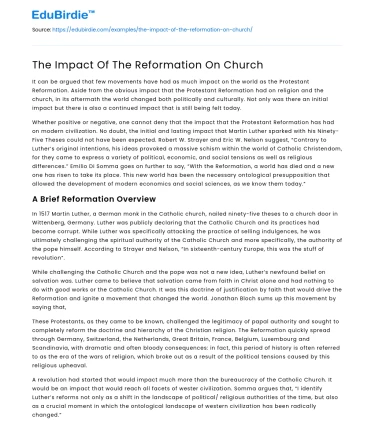It can be argued that few movements have had as much impact on the world as the Protestant Reformation. Aside from the obvious impact that the Protestant Reformation had on religion and the church, in its aftermath the world changed both politically and culturally. Not only was there an initial impact but there is also a continued impact that is still being felt today.
Whether positive or negative, one cannot deny that the impact that the Protestant Reformation has had on modern civilization. No doubt, the initial and lasting impact that Martin Luther sparked with his Ninety-Five Theses could not have been expected. Robert W. Strayer and Eric W. Nelson suggest, “Contrary to Luther’s original intentions, his ideas provoked a massive schism within the world of Catholic Christendom, for they came to express a variety of political, economic, and social tensions as well as religious differences.” Emilio Di Somma goes on further to say, “With the Reformation, a world has died and a new one has risen to take its place. This new world has been the necessary ontological presupposition that allowed the development of modern economics and social sciences, as we know them today.”
Save your time!
We can take care of your essay
- Proper editing and formatting
- Free revision, title page, and bibliography
- Flexible prices and money-back guarantee
A Brief Reformation Overview
In 1517 Martin Luther, a German monk in the Catholic church, nailed ninety-five theses to a church door in Wittenberg, Germany. Luther was publicly declaring that the Catholic Church and its practices had become corrupt. While Luther was specifically attacking the practice of selling indulgences, he was ultimately challenging the spiritual authority of the Catholic Church and more specifically, the authority of the pope himself. According to Strayer and Nelson, “In sixteenth-century Europe, this was the stuff of revolution”.
While challenging the Catholic Church and the pope was not a new idea, Luther’s newfound belief on salvation was. Luther came to believe that salvation came from faith in Christ alone and had nothing to do with good works or the Catholic Church. It was this doctrine of justification by faith that would drive the Reformation and ignite a movement that changed the world. Jonathan Bloch sums up this movement by saying that,
These Protestants, as they came to be known, challenged the legitimacy of papal authority and sought to completely reform the doctrine and hierarchy of the Christian religion. The Reformation quickly spread through Germany, Switzerland, the Netherlands, Great Britain, France, Belgium, Luxembourg and Scandinavia, with dramatic and often bloody consequences: in fact, this period of history is often referred to as the era of the wars of religion, which broke out as a result of the political tensions caused by this religious upheaval.
A revolution had started that would impact much more than the bureaucracy of the Catholic Church. It would be an impact that would reach all facets of wester civilization. Somma argues that, “I identify Luther’s reforms not only as a shift in the landscape of political/ religious authorities of the time, but also as a crucial moment in which the ontological landscape of western civilization has been radically changed.”
Initial Impact of the Reformation
One of the most significant aspects of the initial impact of the Reformation was the shifting of authority from the pope to the kings. Like Martin Luther, the royal class disputed the pope’s authority and had wanted to be free from papal control for some time. They saw the Protestant movement as a way to establish a new independence from the pope’s authority. For example in England, King Henry VIII when seeking annulment of his marriage the pope would not grant it. This event was the tipping point for Henry as he broke from the Catholic Church and declared himself head of the church and created the Church of England. Henry’s support of Protestantism may have been based on own his personal desires for more power, wealth, and a divorce but still the creation of the new Protestant leaning Church of England did lead to some big changes like the creation of the role of clergymen, a move from the priesthood and celibacy, and the elimination of the Catholic Sacraments.
As the newly invented printing press spread throughout Europe, Luther and other reformers were able to print copies of their doctrine and this led to the spread of Protestantism at an unprecedented speed. Luther’s writings were printed at such a rate that an estimated three million copies were sold making him the most read author of his time. With the spread of this “new” doctrine of faith alone, came a shift from the collective mindset of relying on the church to intercede and direct one’s relationship with God. The individual was now in charge of their own spiritual journey. This new idea of individualism was adapted to life outside the spiritual field and began to shift the way common people thought of themselves. They now were free to take charge of their own life. Somma states that, “this theological, radical, transformation is relevant for the birth of economics as a discipline because it represented the historical moment in which the human individual was perceived as such, a single entity before an organized world.”
Another impact that printing press played into was making it possible for the common people to have access to the Bible. Before the Reformation, the Church was the keeper and reader of scripture as it was written in the Latin language that they were well versed in. Martin Luther translated the Bible into the German vernacular that was widely used by the commoner. Again taking control of one’s spiritual journey from that of the church and placing it back with the individual.






 Stuck on your essay?
Stuck on your essay?

